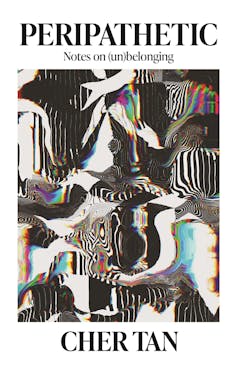Cher Tan honed her defiant creativity in Singapore’s DIY punk scene
- Written by Vanessa Berry, Lecturer in Creative Writing, University of Sydney

In her debut essay collection, Peripathetic: Notes on (un)belonging[1], Cher Tan turns her maverick attention to the possibility and power of resistance. Tan’s essays rise out of a defiant, DIY sensibility and sustain a dissident energy. They examine how meaning, purpose and change can be wrought within – and in opposition to – our digitally networked, late-capitalist world.
The nine essays interlink around identity, technology and counterculture. They investigate topics such as internet culture (“Speed Tests”), precarious work (“Shit Jobs”), weirdness (“Who’s Your Normie?”), punk and DIY cultures (“The Lifestyle Church”) and the work of writing (“This Unskilled Life”).
But to list them this way feels reductive. They are essays of great breadth and ambition, equally about migration, inequality, subversion, survival, how we come to know the things we know, and what we do with that knowledge. As their titles suggest, they also carry a sharp wit and ready humour.
Review: Peripathetic: Notes on (un)belonging – Cher Tan (New South)
Tan is one of a new generation of Australian essayists, including Eda Gunaydin (Root and Branch: Essays on Inheritance[2], 2022), Sally Olds (People Who Lunch: Essays on Work, Leisure & Loose Living[3], 2022) and Gemma Nisbet (The Things We Live With: Essays on Uncertainty[4] 2023).
These essay collections investigate a central concept in associative and digressive ways. In each, the sequence of essays might not form a linear narrative, but the writer’s sensibility, voice and life experiences unites them into a whole.
Unbelonging, restlessness and digital life
Peripathetic is subtitled “Notes on (un)belonging”. “Notes” suggests direct communication: thoughts and ideas captured in the moment. It also suggests a more physical or tactile text, and Tan uses techniques such as fragmentation, footnotes and blacked-out, redacted text to subtly distinguish each essay.
Thematically, “(un)belonging” suggests restlessness. Belonging is a slippery concept, always in dialogue with its opposite. In the opening essay, “Is this Real?”, Tan tracks the ideal of a cohesive self across physical and virtual realms. There is no longer a stark divide between what’s considered real and digital life, as Tan describes:
You can now be anyone and anything and yet still be yourself. IRL feeds into URL into IRL and over and over again. A GIF of a snake eating its own tail.
Like the endlessly cycling motion of a GIF, the essays in Peripathetic move deftly between life writing and critique. They wield incisive humour and references that span from high theory to niche DIY publications. In a 2018 piece published by Meanjin, On Writing[5], Tan expressed her commitment to putting her ideas in conversation with other thinkers. With characteristic directness, she explained: “I write to cite”.

















